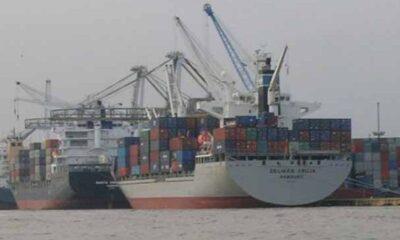Business
White Dove’s Pioneering Efforts in Alternative Crude Evacuation, A Differentiating Factor – CEO
Published
2 years agoon
By
Editor
White Dove Shipping Company Limited has disclosed that its pioneering efforts in Alternative Crude Evacuation, which is mitigating crude theft and other losses arising from pipeline vandalism, has positioned it as the preferred local shipping operator for oil and gas companies in the country.
The company stated that despite the sector being capital intensive, it remained focused on its five-year strategic growth plan which would see it increase capacity from evacuating 50,000 bpd to 150,000 bpd.
Chiemezie Ejinima, the Chief Executive Officer of the company disclosed this in a virtual media chat with select maritime and energy reporters, where he stated that it intended to effectively cater to the crude evacuation needs of oil & gas players in the country.
He asserted that White Dove was able to create employment for Nigerians by seeing a subset of the shipping sector – crude evacuation – that wasn’t active and made it active, thus filling the gap in the value chain which was why it has over 90 percent local workers with plans to continue to grow the capacity of more local seafarers and maritime workers.
He said, “Our vessels are manned by Nigerians and we partner with the Nigeria Maritime Academy, Seafarers and other players to boost local expertise and capacity as we want to grow our local content to 100 percent in the nearest future’’.
He described the shipping sector as an important commercial sector, capable of employing thousands of Nigerians.
Ejinima explained that White Dove chose to focus on crude evacuation due to its huge economic potentials for the country, plus the need to make oil & gas companies get value for their investments, given that with the alternative crude evacuation, oil companies are assured of retaining their crude volumes from point of production to exportation.
“This will also boost the revenue accruable to the government as more royalties and taxes will be paid,” he added.
READ ALSO: Reps Approve Special Bank For Entrepreneurs, Small Businesses
According to him, the huge capital intensive nature of the sector, characterized by high acquisition and operating costs, remains one of the major reasons why foreign shipping companies still dominate, but as supportive banks, provide access to funding, more local players can begin to thrive in the sector.
‘’White Dove came on board as a one-stop-shop due to the gap noticed in the traditional evacuation of crude oil through pipelines. The age and accessibility of pipelines for crude transportation led to breaches and vandalism, thus creating the need for an alternative evacuation system through barges tankers and other vessels.
‘’We came in to ensure proper crude evacuation from the point of production to the point of export and our various vessels and transportation mode help to ensure that oil producers can be certain about the quantity of their products end-to-end’’ he added.
You may like


Snake Island To Attract $1bn Private Investment – Official


Manufacturers In Dire Straits As Unsold Goods Hit N470bn


Foreign Portfolio Investments Drop 49% In 2 Months Of 2023


2023: Ovia Youths Begins Mobilisation For Igbinedion


Congress rolls out ‘Better Deal,’ new economic agenda


MSNBC finishes first in primetime basic cable for first time ever

The Central Bank of Nigeria (CBN) started fresh and direct sales of US dollars at N1,021 per dollar to Bureau De Change operators.
Nigeria’s apex bank disclosed this in a circular signed by its Director of Trade and Exchange Department Hassan Mahmud.
“We write to inform you of the sale of $10,000 by the Central Bank of Nigeria (CBN) to BDCs at the rate of N1,021/$1. The BDCs are in turn to sell to eligible end users at a spread of NOT MORE THAN 1.5 percent above the purchase price,” the circular posted on its website read.
READ ALSO: Tinubu Unveils African Counter-Terrorism Summit
“ALL eligible BDCs are therefore directed to commence payment of the Naira deposit to the underlisted CBN Naira Deposit Account Numbers from today, Monday, April 22, 2024, and submit confirmation of payment, with other necessary documentations, for disbursement of FX at the respective CBN Branches.”
CBN’s move is coming as the naira is recording a slight depreciation against the dollar after weeks of gains.
In late March, the bank also sold $10,000 to each of the eligible Bureau De Change (BDC) operators in the country at the rate of N1,251/$1.
READ ALSO: Mixed Reactions Trail Video Of Couple’s Customised N200 Notes
Like in the most recent sales, it warned BDCs against breaching terms of the dollar sales, vowing to sanction defaulters “including outright suspension from further participation in the sale”.
The fortunes of the naira have fallen sharply since President Bola Tinubu took over in May. Inflation figures have reached new highs and the cost of living hitting the rooftops.
Nigeria’s currency slid to about N1,900/$ some months ago at the parallel market. But in recent weeks, it has gained against the dollar.
The Nigerian authorities have also doubled down on their crackdown against cryptocurrency platform Binance and illegal BDCs.
On March 1, the CBN revoked the licences of 4,173 BDCs over compliance failures.

Olusegun Alebiosu has been appointed as the Acting Managing Director/Chief Executive Officer of First Bank of Nigeria Limited (FirstBank Group), effective April 2024.
Alebiosu steps into this pivotal role from his previous position as the Executive Director, Chief Risk Officer, and Executive Compliance Officer, a position he held since January 2022.
Alebiosu brings to the helm of FirstBank over 28 years of extensive experience in the banking and financial services industry. His expertise spans various domains including credit risk management, financial planning and control, corporate and commercial banking, agriculture financing, oil and gas, transportation, and project financing.
READ ALSO: JUST IN: Access Holdings Names New Acting CEO
Having embarked on his professional journey in 1991 with Oceanic Bank Plc. (now EcoBank Plc.), Alebiosu has held several notable positions in esteemed financial institutions.
Prior to joining FirstBank in 2016, he served as Chief Risk Officer at Coronation Merchant Bank Limited, Chief Credit Risk Officer at the African Development Bank Group, and Group Head of Credit Policy & Deputy Chief Credit Risk Officer at United Bank for Africa Plc.
Alebiosu’s academic credentials further enrich his professional profile. He is an alumnus of the Harvard School of Government and holds a Bachelor’s degree in Industrial Relations and Personnel Management. Additionally, he obtained a Master’s degree in International Law and Diplomacy from the University of Lagos, as well as a Master’s degree in Development Studies from the London School of Economics and Political Science.
READ ALSO: Meet Newly Appointed Union Bank CEO
A distinguished member of various professional bodies, including the Institute of Chartered Accountants (FCA), Nigeria Institute of Management (ANIM), and Chartered Institute of Bankers of Nigeria (CIBN), Alebiosu is renowned for his commitment to excellence and ethical practices in the banking sector.
Beyond his professional endeavors, Alebiosu is known for his passion for golf and adventure. He is happily married and a proud parent.
With Alebiosu’s appointment, FirstBank of Nigeria Limited anticipates continued growth and innovation under his leadership, reinforcing its position as a leading financial institution in Nigeria and beyond.
Business
CBN Gives New Directive On Lending In Real Estate
Published
1 week agoon
April 17, 2024By
Editor
The Central Bank of Nigeria, CBN, has released a new regulatory directive to enhance lending to the real sector of the Nigerian economy.
The directive, issued on April 17, 2024, with reference number BSD/DIR/PUB/LAB/017/005 and signed by the Acting Director of Banking Supervision, Adetona Adedeji, signifies a notable shift in the bank’s policy towards a more contractionary approach.
In line with the new measures, the CBN has reduced the loan-to-deposit ratio by 15 percentage points, down to 50 per cent.
This move aligns with the CBN’s current monetary tightening policies and reflects the increase in the Cash Reserve ratio rate for banks.
READ ALSO: JUST IN: CBN Gov Sacks Eight Directors, 32 Others
The LDR is a metric used to evaluate a bank’s liquidity by comparing its total loans to its total deposits over the same period, expressed as a percentage.
An excessively high ratio may indicate insufficient liquidity to meet unexpected fund requirements.
All Deposit Money Banks are now mandated to adhere to this revised LDR.
The CBN has stated that average daily figures will be utilised to gauge compliance with this directive.
Furthermore, while DMBs are encouraged to maintain robust risk management practices in their lending activities, the CBN has committed to continuous monitoring of adherence and will adjust the LDR as necessary based on market developments.
READ ALSO: JUST IN: CBN Increases Interest Rate To 24.75%
Adedeji has called on all banks to acknowledge these modifications and adjust their operations accordingly. He emphasised that this regulatory adjustment is anticipated to significantly influence the banking sector and the wider Nigerian economy.
The circular read in part, “Following a shift in the Bank’s policy stance towards a more contractionary approach, it is crucial to revise the loan-to-deposit ratio policy to conform with the CBN’s ongoing monetary tightening.
“Consequently, the CBN has decided to decrease the LDR by 15 percentage points to 50 per cent, proportionate to the rise in the CRR rate for banks.
“All DMBs must maintain this level, and it is advised that average daily figures will still be applied for compliance assessment.
“While DMBs are urged to sustain strong risk management practices concerning their lending operations, the CBN will persist in monitoring compliance, reviewing market developments, and making necessary adjustments to the LDR. Please be guided accordingly.”

Group Of Top Male Footballers ‘Planning To Come Out As Gay Next Month

Saudi Arabia Opens First Alcohol Store, Nigerian Muslims React

243 Passengers Cheat Death As Air Peace Plane Makes Emergency Landing At Lagos Airport
Trending

 Entertainment3 days ago
Entertainment3 days agoBridesmaids’ Dance At Wedding Causes Stir On Social Media [VIDEO/PHOTOS]

 Politics4 days ago
Politics4 days agoEdo Guber: Akoko-Edo PDP Leaders Meet In Igara, Describe Ighodalo, Ogie As ‘Perfect Match’

 Metro3 days ago
Metro3 days agoVIDEO: ‘UNN Lecturer’ Caught Pants Down With Married Student

 News4 days ago
News4 days agoOutrage As Chinese Supermarket In Abuja Denies Nigerians Entry

 News1 day ago
News1 day agoDrama! Supporters Of Yahaya Bello Perform Rituals to Prevent His Arrest By EFCC [Video]

 News3 days ago
News3 days agoIGP, Jonathan Disagree Over State Police

 News1 day ago
News1 day agoVIDEO: Force PRO Orders Arrest Officers Caught On Video Bashing Driver’s Car

 Headline2 days ago
Headline2 days agoDrama As Women Fight Dirty, Breasts Fall Out During Spring Break Outing In US [PHOTOS/VIDEO]

 Entertainment2 days ago
Entertainment2 days agoNollywood Actor, Zulu Adigwe Is Dead

 Headline2 days ago
Headline2 days agoMeet 17-year-old Nigerian Who Won $3.5m Worth Of Scholarships From Harvard, 13 Other Foreign Universities

































